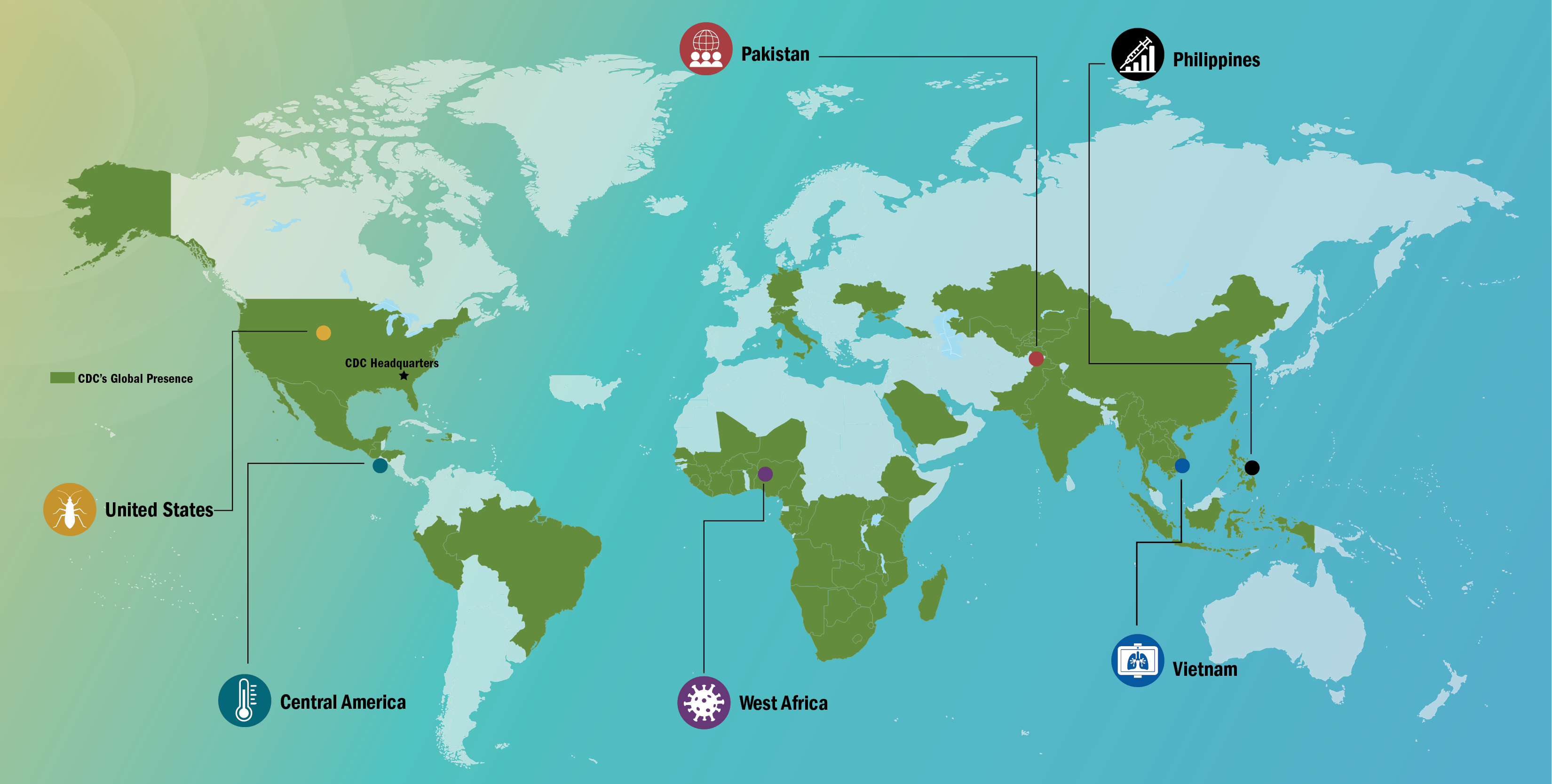Global Partnerships Save Lives
CDC has over 60 country offices that work with ministries of health and other partners on the front lines. Although CDC’s overseas offices include staff assigned to the country office from CDC Headquarters in Atlanta, most of its overseas workforce are locally employed staff from the countries in which it works. CDC only works in countries that request our technical assistance and collaboration. CDC’s capacity development work is uniquely designed to be owned by partner countries.
Chagas disease is an underrecognized parasitic infection that affects approximately 300,000 people in the United States. The disease can be passed from mother to baby, with as many as 300 babies born with Chagas disease every year. Tragically, most of these infections are undiagnosed. When left untreated, Chagas disease can cause heart failure, stroke, and even death. The key to preventing these outcomes is to educate healthcare providers to diagnose and prescribe treatment before patients develop problems with their hearts. Since 2015, CDC has funded partners to develop new strategies, educational tools, materials, and guidelines to improve awareness and prevention of Chagas disease. CDC helps improve diagnosis and treatment of Chagas disease through continuing medical education materials and patient and provider educational information.
Acute Febrile Illness (AFI) is an acute fever that can be caused by multiple pathogens. Substantial knowledge gaps exist regarding underlying causes and patterns of AFI, particularly in lower and middle income countries. CDC Central America Region (CAR) works with countries to better understand causes of fever, to strengthen surveillance and laboratory capacities, to develop prevention and control measures, and to inform clinical management. CDC CAR helped to create a network to develop the first multi-country platform that identifies causes of illness not previously recognized in the region. CDC’s AFI work extends beyond CAR to more than 20 countries worldwide.
CDC supported polio, measles, and rubella campaigns, reaching over 90 million children in Nov. 2021. Pakistan and partners delivered the multi-antigen campaign to close gaps widened by the COVID-19 pandemic.
At the end of 2020, Philippines ensured that over 9 million at-risk children received protection against measles and rubella, and nearly 7 million children received protection against polio. CDC supported this national, two-phased integrated campaign by providing remote technical assistance from CDC headquarters. CDC also deployed 12 STOP Program experts to assist with vaccine campaign implementation, monitoring and evaluation, and to strengthen routine immunization.
CDC Nigeria’s remote COVID-19 training success led to an expansion of the Extension for Community Healthcare Outcomes (ECHO) concept. In February 2021, the University of New Mexico, U.S. CDC, CDC Nigeria, and the Nigerian government launched the West Africa Regional ECHO knowledge sharing platform for the COVID-19 Response. By mid-July 2021, thousands of West Africa healthcare workers had received COVID-19 case management and vaccination training. The West Africa Regional ECHO also serves as a platform for addressing misinformation across the region.
CDC Vietnam and partners implemented the Double X diagnostic strategy, tripled tuberculosis (TB) diagnoses, and improved access to TB treatment for people living with HIV (PLHIV). The proportion of antiretroviral therapy (ART) patients who received TB treatment increased from 0.2% to 0.7%. The results helped inform the revision of Vietnam’s national guidelines for diagnosing and treating TB among PLHIV. The Double X strategy enhances case finding by using both a chest X-ray and a rapid molecular diagnostic test. The Double X diagnostic strategy was implemented in three provinces from July to September 2020. A total of 6,389 PLHIV were screened for TB symptoms. Of the PLHIV screened, 1,479 (23%) had a TB-like symptom.
